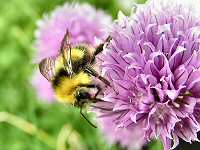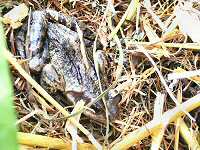Features: Wildlife Trust Articles |  |
Gardening without skips
Sometimes gardening presents us with a real paradox:  gardeners love nature, yet the pursuit of gardening contributes to many environmental problems gardeners love nature, yet the pursuit of gardening contributes to many environmental problems gardeners love nature, yet the pursuit of gardening contributes to many environmental problems. How many times does a garden 'makeover' program start with filling a skip? Viewers must have come to look upon the skip as an indispensable gardening tool; certainly the programs themselves never question their use. But what happens to the thousands of skips we fill in our pursuit of instant gardens? gardeners love nature, yet the pursuit of gardening contributes to many environmental problems. How many times does a garden 'makeover' program start with filling a skip? Viewers must have come to look upon the skip as an indispensable gardening tool; certainly the programs themselves never question their use. But what happens to the thousands of skips we fill in our pursuit of instant gardens?
A problem for the wider countryside Bubmlebees are in trouble in the wider countryside, but we can help them in our gardens.
In my town a landfill site (active until recently) covers part of a peat moss - a Site of Special Scientific Interest. While the town's residents were busy filling skips to make their gardens beautiful, others were taken away to be emptied over one of our most endangered wildlife habitats. Bubmlebees are in trouble in the wider countryside, but we can help them in our gardens.
In my town a landfill site (active until recently) covers part of a peat moss - a Site of Special Scientific Interest. While the town's residents were busy filling skips to make their gardens beautiful, others were taken away to be emptied over one of our most endangered wildlife habitats.
And talking of peat,  the conflict between gardening and conservation is nowhere as stark as in our use of peat the conflict between gardening and conservation is nowhere as stark as in our use of peat the conflict between gardening and conservation is nowhere as stark as in our use of peat. Gardeners for a hundred years or more have used peat to such an extent that British peat bogs and mosses have been degraded to become the merest shadow of their former selves. We have belatedly protected what we have left; but concerned to feed our undiminished appetite, the horticultural suppliers have turned to peat bogs in other countries, notably Ireland, to keep us satisfied. the conflict between gardening and conservation is nowhere as stark as in our use of peat. Gardeners for a hundred years or more have used peat to such an extent that British peat bogs and mosses have been degraded to become the merest shadow of their former selves. We have belatedly protected what we have left; but concerned to feed our undiminished appetite, the horticultural suppliers have turned to peat bogs in other countries, notably Ireland, to keep us satisfied.
Aggressive gardening Hedgehogs can be encouraged in gardens with rough edges and untidy corners where leaves, compost etc. will provide shelter.
Television has a lot to answer for: particularly with its obsession with instant results. Gardening at its best is a slow and thoughtful process where the character of what is already there has an important bearing on what is to come, Hedgehogs can be encouraged in gardens with rough edges and untidy corners where leaves, compost etc. will provide shelter.
Television has a lot to answer for: particularly with its obsession with instant results. Gardening at its best is a slow and thoughtful process where the character of what is already there has an important bearing on what is to come,
 you can see why people think that it's normal to garden by ripping out everything that's already there and imposing an arbitrary design in its place you can see why people think that it's normal to garden by ripping out everything that's already there and imposing an arbitrary design in its place but there is no room for that kind of subtlety in the 'two day garden makeover' TV format. Add to this the influence of the 'show garden' culture of the Royal Horticultural Society and you can see why people think that it's normal to garden by ripping out everything that's already there and imposing an arbitrary design in its place (and all in the space of a few days).
but there is no room for that kind of subtlety in the 'two day garden makeover' TV format. Add to this the influence of the 'show garden' culture of the Royal Horticultural Society and you can see why people think that it's normal to garden by ripping out everything that's already there and imposing an arbitrary design in its place (and all in the space of a few days).
Thoughtful gardening
As wildlife gardeners we want to be sure that in making our gardens good for wildlife we do not diminish wildlife habitats in the wider environment. One of the easiest ways to start is by saying no to peat. Thankfully many (but by no means all) garden retailers now sell 100% peat free growing mediums and soil improvers as an alternative to peat-based products. We can also be more thoughtful about what we export from our gardens to landfill sites:  rubble, wood and even soil are all blindly tossed into skips; but much of this material could be carefully used in the garden to benefit wildlife rubble, wood and even soil are all blindly tossed into skips; but much of this material could be carefully used in the garden to benefit wildlife rubble, wood and even soil are all blindly tossed into skips; but much of this material could be carefully used in the garden to benefit wildlife. I'm not saying that there is never a case for using a skip; just that a large proportion of them are unnecessary. rubble, wood and even soil are all blindly tossed into skips; but much of this material could be carefully used in the garden to benefit wildlife. I'm not saying that there is never a case for using a skip; just that a large proportion of them are unnecessary.
When my father-in-law retired he gave his garden a makeover, but it took him more than two days: he'd already been thinking about it for a few years and he took a year or two more to bring his plans to fruition. Along the way he unexpectedly dug up a lot of stone, which he incorporated into a patio, and even a massive block of concrete, which he turned into an attractive (I'm serious) garden seat. I doubt if using a skip ever entered his head: the challenge for him was to use what was already there to make an evolutionary change for the better in his garden.
Compost heaps I regularly find frogs in my compost heap; as I did this one.
A great thing you can do for your garden's wildlife and the wider environment is to have a compost heap. In themselves they are great habitats for wildlife, harbouring many thousands of invertebrates which in turn attract other animals. I regularly find frogs in my compost heap and this year a vole has made itself at home there. Other gardeners are lucky enough to have grass-snakes laying eggs in theirs and quite often bumblebees will establish their small colonies in them. I regularly find frogs in my compost heap; as I did this one.
A great thing you can do for your garden's wildlife and the wider environment is to have a compost heap. In themselves they are great habitats for wildlife, harbouring many thousands of invertebrates which in turn attract other animals. I regularly find frogs in my compost heap and this year a vole has made itself at home there. Other gardeners are lucky enough to have grass-snakes laying eggs in theirs and quite often bumblebees will establish their small colonies in them.  Don't be put off by the idea that compost heaps are complicated to look after: essentially all you need is a pile of garden and/or kitchen waste! Don't be put off by the idea that compost heaps are complicated to look after: essentially all you need is a pile of garden and/or kitchen waste! Don't be put off by the idea that compost heaps are complicated to look after: essentially all you need is a pile of garden and/or kitchen waste! There are certain things you can do to make the waste compost more quickly (plenty of sources on the web), but they are not essential from the wildlife habitat dimension. Don't be put off by the idea that compost heaps are complicated to look after: essentially all you need is a pile of garden and/or kitchen waste! There are certain things you can do to make the waste compost more quickly (plenty of sources on the web), but they are not essential from the wildlife habitat dimension.
Here are two rules of thumb for wildlife gardeners:
- never bring anything into your garden without thinking carefully about where it has come from;
- never take anything out of your garden without thinking carefully about where it is going to.
| First published July 2004. | |
Copyright Richard Burkmar. Permission is hereby granted for anyone to use this article for non-commercial purposes which are of benefit to the natural environment as long the original author is credited. School pupils, students, teachers and educators are invited to use the article freely. Use for commercial purposes is prohibited unless permission is obtained from the copyright holder. |
Back to home page
Do you live in Merseyside? Interested in its wildlife? |